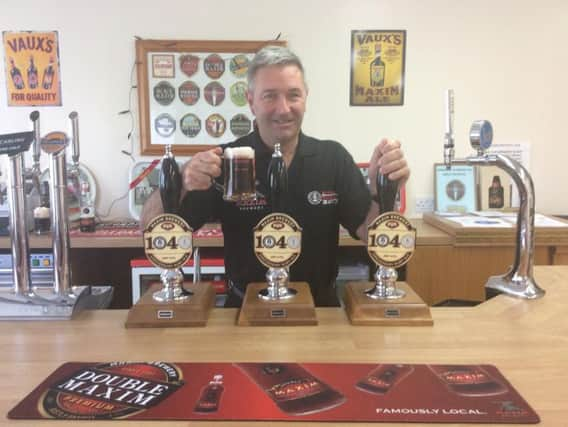Sunderland brewery marks a decade since bringing beer production back to the city


Time was called on nearly 200 years of history in July 1999 when the final beer was produced at Sunderland’s landmark Vaux Breweries site.
Despite the brewing side of the company’s operations still making a sizeable £50m annual profit, financiers in the City of London had advised the firm to cease production and concentrate its efforts on its estate of pubs and hotels.
Advertisement
Hide AdAdvertisement
Hide AdAround 700 jobs were lost and the resulting reorganisation saw the Vaux name quickly disappear from Sunderland’s skyline with the business becoming Swallow Inns and Restaurants.
This in itself was soon bought - or swallowed up, even - by Whitbread Breweries.
Yet thankfully that was far from the end of the story.
Undeterred by an unsuccessful management buyout bid, finance director Mark Anderson and two Vaux colleagues started purchasing the rights to produce famous brands such as Double Maxim and Samson.
The Double Maxim Brewery Company was born and based at offices in Wearfield, on Sunderland Enterprise Park, with Double Maxim itself the first beer to be resurrected and brewed at Stockport’s Robinson’s Brewery.
Advertisement
Hide AdAdvertisement
Hide AdMr Anderson recalls: “It was a risk as it was rare and still is for new breweries to buy out old names and keep them going. Usually their unique selling point is to come up with something new.”
Despite its brief demise, drinkers stayed loyal to a brown ale which was first brewed in 1901 to mark the return of the Maxim Gun Detachment from the Boer War.
Ward’s Bitter, originally produced by Vaux sister brewery Ward’s in Sheffield, followed with a second Vaux favourite, Samson brown beer, returning in 2005.
By now firmly established as part of the United Kingdom’s flourishing craft beer market, the company moved south of the river to Rainton Bridge, near Houghton, in 2007 to begin brewing its own beer as the renamed Maxim Brewery.
Advertisement
Hide AdAdvertisement
Hide AdMr Anderson, 55, remembers: “To see the first beer produced and taste it and realise it was as it should be was a fantastic moment.
“The heart of a beer business is its brewery. Once the Vaux brewery closed the heart of the business seemed to be ripped out and now it was alive again.”
Orders and awards soon followed as beers new and old were produced for barrel and bottle.
Now employing a team of nine, the brewery produces up to 17,000 pints a week.
Advertisement
Hide AdAdvertisement
Hide AdIts beers include seasonal ales such as the Great Escape pale ale - “like the movie, it’s on at Christmas,” quips Mr Anderson - and John Bull stout.
Managing director Mr Anderson, who was raised in Sheffield and moved north from Ward’s to Vaux in 1995, says: “Vaux actually produced more stout than Guinness at one time.
“That all changed during the First World when there was restrictions on transport because of the need to save fuel and because alcohol
contents were reduced so that factory workers were in better condition to work.
Advertisement
Hide AdAdvertisement
Hide Ad“Guinness, coming across from Ireland, did not have to abide by the restrictions and became more popular as a result.
“Ironically, we export John Bull now to Wetherspoons pubs in southern Ireland and it sells more pints than Guinness in the pubs there.”
As well as selling cask beer to large pub chains such as JD Wetherspoon and Punch Taverns plus local companies Enterprise Inns and Sir John Fitzgerald, Maxim Brewery also stocks its bottles across the North East in High Street outlets Asda, Tesco, Sainsbury’s, Spar, Morrisons and the Co-op.
It does not, however, forget everyday customers and caters for smaller runs such as its recent 1040 ruby ale to mark both its 10th anniversary in Houghton and the 40th birthday of the Sunderland and South Shields branch of the Campaign for Real Ale (Camra) branch.With Maxim Brewery now the only full-time brewing operation in Sunderland, Mr Anderson is cautiously optimistic for what he calls a “labour of love”.
Advertisement
Hide AdAdvertisement
Hide AdHe adds: “We want to carry on our success of the last 10 years and build on our exports in a very competitive market to cover more of the UK.
“The market has changed considerably in the last 10 years and yet it hasn’t.
“In one sense, it has changed because whereas the pubs used to buy two or three barrels now it’s just a barrel due to factors such as the recession, pubs closing and the smoking ban.
“On the other hand, the take home market has market has increased from 25 per cent to 51 per cent and is now the dominant factor.
Advertisement
Hide AdAdvertisement
Hide Ad“While the rise in craft beers and micro breweries has helped us, some of the successful smaller breweries have been taken over by the bigger companies who still dominate 93 per cent of the market like they did 10 years ago.
“Hopefully our own unique selling point in protecting the city’s brewing heritage while creating new and interesting beers will continue to help us.”